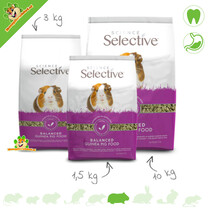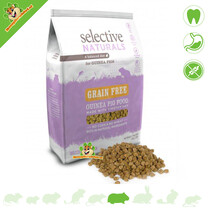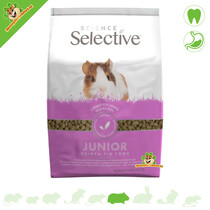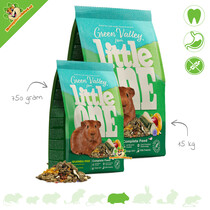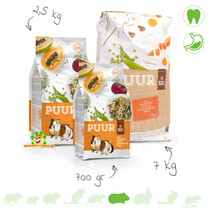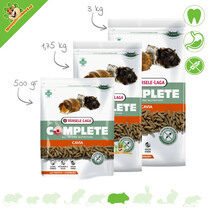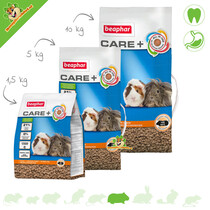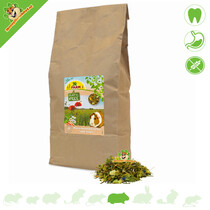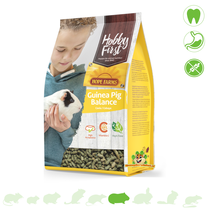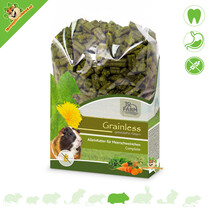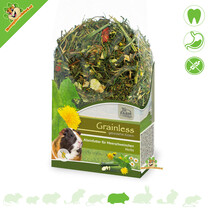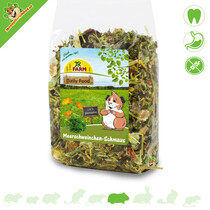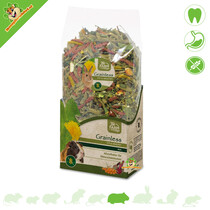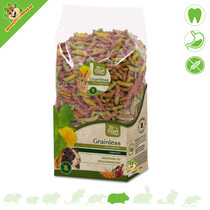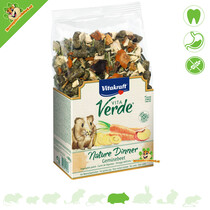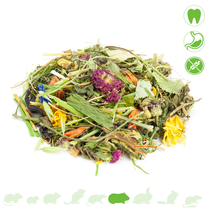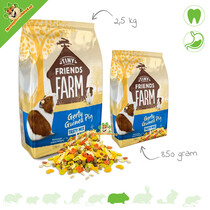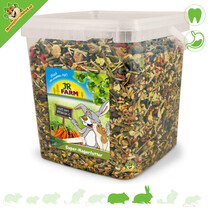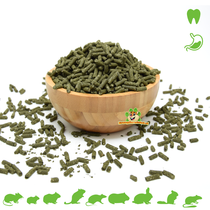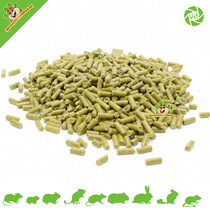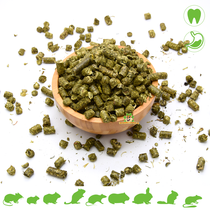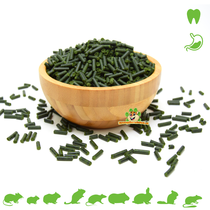Guinea Pig Food and Natural Guinea Pig Food | DRD Knaagdierwinkel®
Supreme Selective is a complete, balanced food for guinea pigs. with the addition of dandelion, fennel & nettle. Composed of a combination of high-quality ingredients, it provides a complete and balanced diet in the form of a tasty chunk. With lucerne (al
Read moreSupreme Selective Grain Free guinea pig food is mixed with the temptingly tasty Timothy Hay to promote the good health of guinea pigs. Long fiber and grain-free, Selective respects the natural diet of the guinea pig. It supports digestive wellbeing and ha
Read moreSelective Junior Guinea Pig is recommended by veterinarians and is a delicious and balanced food for guinea pigs up to 20 weeks old. The monocomponent extruded kibble contains lots of fiber to support healthy teeth and tummies and is full of natural ingre
Read moreGuinea pig food Green Valley consists of no fewer than 60 different types of herbs, flowers and grasses. The Guinea pigs don't know what will happen to them with this delicious and very varied food! Made using a special cold pressing technology, which pre
Read more- Ordered before 5 p.m., shipped the same day!
- Personal & expert advice
- A trusted name for 14 years!
Guinea pig food from Witte Molen PUUR Cavia is a pure & varied gourmet muesli for guinea pigs. The food consists of special ingredients that are tailored to the nutritional needs of the guinea pig. Witte Molen PUUR Cavia is formulated without artificial p
Read moreGuinea pig food from Versele Laga Complete Cavia is food without worries. The particularly tasty All in 1 granule prevents selective eating behavior. This way your guinea pig gets all the essential nutrients and remains healthy. The food with long fibers
Read moreGuinea pig food from Beaphar Care+ Cavia is a tasty and balanced food for guinea pigs. The Care+ food has been developed in collaboration with veterinarians and nutritionists in the field of guinea pig food. Beaphar Care+ Guinea Pig is an extruded all-in-
Read moreNature Cavia is the responsible tasty food for a healthy guinea pig. The food is 100% grain-free and has a very high crude fiber content, this combination contributes to healthy intestinal function. With around 30 different grass and herb species, the die
Read more- Ordered before 5 p.m., shipped the same day!
- Personal & expert advice
- A trusted name for 14 years!
It's FREE of all 3... plastic, grains and pellets! This JR FARM Guinea Pig Natural Complete Food without pellets is a wonderful mixture of fragrant mountain meadow hay from native, natural meadows in the heart of Bavaria (Germany) and a variety of herbs,
Read moreBunny CaviaDroom Basic Caviavoer is a balanced food specially composed for guinea pigs from 5 months old. The nutritional needs of guinea pigs and recent scientific insights were taken into account when developing this food.
Read moreHope Farms Guinea Pig Balance is a healthy, complete food with valuable raw materials and tasty ingredients such as grains, seeds and alfalfa. This food contains all the necessary vitamins and minerals to keep guinea pigs in good condition. ...
Read moreGuinea pig food from JR Farm Grainless Complete Cavia consists of 100% grain-free Quad-Bits, which combines all special Grainless components in one and also supports tooth wear due to its special shape. Selective eating is no longer possible due to an opt
Read more- Ordered before 5 p.m., shipped the same day!
- Personal & expert advice
- A trusted name for 14 years!
Guinea pig food from JR Farm Grainless Herbs Guinea pig is a special food mix made from various long-fiber grasses and herbs, which, together with many vegetables and flowers, form the optimal nutritional basis for a healthy life for your guinea pig. With
Read moreGuinea pig food from JR Farm Cavia Schmaus is a natural complete food mix that is suitable for all guinea pigs. The high fiber content and low percentage of grain support healthy digestion and prevent rabbits from becoming overweight. With lots of vegetab
Read moreJR Grainless Health Mix is grain-free, partially extruded food with an extra dose of health. The complete food mix with extra crude fiber and the addition of important vitamins contributes to a balanced diet and good health of your guinea pigs. The mix
Read moreGuinea pig food from JR Farm Grainless Health Complete is the grain-free, fully extruded food with an extra portion of health. The complete food mixture with extra crude fiber and the plus of important vitamins contributes to a balanced diet and keeping y
Read more- Ordered before 5 p.m., shipped the same day!
- Personal & expert advice
- A trusted name for 14 years!
Spoil your guinea pigs with food that seems to come straight from the vegetable garden! At Vitakraft we understand that nothing beats the taste of crispy carrots and tasty parsnips from your own garden. That's why we introduce Vita Verde® Nature Dinner Ve
Read moreMr. Crumble Natural Guinea Pig Food is a complete animal food for guinea pigs. This natural food has been composed with the greatest care from various flowers and herbs and is completely pellet-free.
Read moreGuinea pig food from Supreme Tiny Friends Farm is a balanced food especially for guinea pigs. They have been developed with the help of nutritional experts to meet the daily needs of each specific rodent species. A supplementary food for guinea pigs of al
Read moreThe JR Farm Super Rodent Food is a balanced nutritional mix specially formulated to meet the nutritional needs of guinea pigs and rabbits. With a combination of high-quality ingredients, vegetables, vitamins and minerals, this food provides a good basis f
Read more- Ordered before 5 p.m., shipped the same day!
- Personal & expert advice
- A trusted name for 14 years!
Thyme Pellets are a delicious enrichment of the diet of rodents and rabbits. Thyme is not only tasty but also very healthy. The pellets are approximately 4 mm in size and are made entirely from fresh Thyme.
Read moreThese parsley pellets are not only very tasty, they are also an ideal source of vitamin C and support the immune system of your beloved rodent. Very important for guinea pigs, for example, as these animals cannot produce the necessary vitamin C themselves
Read moreThese delicious organic chunks are rich in fiber-rich Timothy grass, which is not only tasty but also very healthy for rodents and rabbits. The kibble supports digestion and helps wear down the teeth. The kibble is also ideal to use as a small reward or a
Read moreGet ready to enter rodent paradise with the irresistible Rodent Grocer Basil Pellets! This nutritional sensation is specially designed to pamper your beloved rodents and rabbits. It's not just a treat - it's a tasty addition to their daily diet.
Read moreYou can order guinea pig food for your beloved guinea pigs easily and quickly at DRD Knaagdierwinkel®
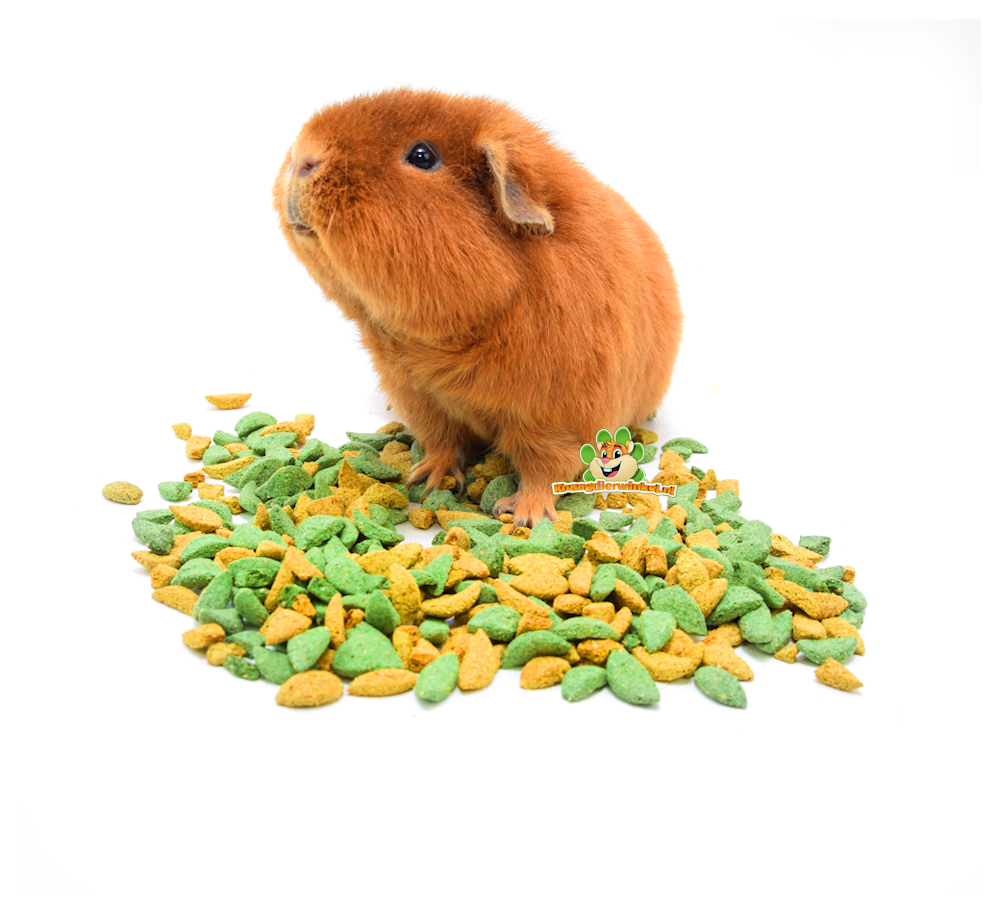
Welcome to DRD Knaagdierwinkel, the guinea pig webshop for high-quality guinea pig food and natural guinea pig food. Discover our extensive range of healthy and balanced food for your beloved guinea pigs.
You can always order guinea pig food for your guinea pig easily and quickly at DRD Knaagdierwinkel! Would you like to spoil your guinea pig with healthy, balanced guinea pig food? With us you will find different types of guinea pig food for an attractive price. Ordering is easy and fast at DRD Knaagdierwinkel!
We understand the needs of your guinea pig like no other. That's why we offer an extensive selection of healthy, balanced guinea pig food that will make your guinea pig's mouth water. What makes our offer so special?
Why choose our guinea pig food?
-
Diversity: Our guinea pig food collection offers a wide variety of options, including dry food, vegetables, fruit and more, so your guinea pigs can always enjoy varied meals.
-
Easy Ordering: Order your guinea pig food quickly and easily at DRD Knaagdierwinkel, so you can quickly spoil your furry friends.
-
Affordable Prices: We understand that quality should be affordable. That is why we offer attractive prices for the best guinea pig food.
Types of Guinea Pig Food
Guinea pig food is available in various forms, including dry food, pellets and muesli-like mixtures. It is important to understand which type of food is best suited for your guinea pigs. In general, pellets are often recommended as they provide balanced nutrition and prevent guinea pigs from selective eating. Pellets contain all the essential nutrients that guinea pigs need, including vitamin C.
Vitamin C Supplementation and Guinea Pig Food
As mentioned earlier, guinea pigs need extra vitamin C in their diet because they cannot produce this vitamin themselves. A vitamin C deficiency can lead to serious health problems, including scurvy. In addition to vitamin C-rich vegetables and special tablets, you can ensure that the guinea pig food you choose contains sufficient vitamin C.
Guinea pig food and nutritional diversity
Although pellets form the basis of the diet, it is important to provide guinea pigs with a varied diet. This means that in addition to dry food, you should also offer fresh green food and fruit. Guinea pigs like variety and variety in their diet, which encourages them to eat enough.
Hay and roughage next to guinea pig food
Hay is an indispensable part of guinea pigs' diet. Not only does it provide fiber essential for healthy digestion, but it also helps with tooth wear. Guinea pigs should have access to fresh hay at all times. Make sure the hay is clean and dust-free to prevent respiratory problems.
Fresh Green Food and Fruit
Guinea pigs enjoy a variety of fruits and vegetables. This includes leafy vegetables such as endive, iceberg lettuce, spinach and parsley, as well as peppers, carrots, tomatoes and other vegetables with a high vitamin C content. Fruits such as apple, pear and orange can be given in moderation because of the fruit sugars.
Be careful with cabbage types
It is important to note that brassicas, such as kale and broccoli, are not suitable for guinea pigs. These vegetables can cause gas and digestive problems. Older and weaker guinea pigs are particularly sensitive to these effects.
Water
In addition to solid food, fresh water is essential for guinea pig health. Make sure they always have access to clean drinking water. Guinea pigs' drinking behavior can vary depending on their diet, so it is important to check and refill their water bottle regularly.
Nutritional balance
Maintaining a balanced diet for guinea pigs is crucial to prevent obesity or deficiencies. Being overweight can lead to health problems, such as cardiovascular disease, while being deficient can lead to other health problems. It is advisable to consult with a veterinarian about the appropriate diet for your guinea pig, especially if they have specific health concerns.
Why do Guinea pigs prefer to eat all day long?
Guinea pigs actually prefer to eat all day long, so it is nice for the animals to spread the feeding throughout the day. For example, dry food twice a day and fruit and vegetables at other times.
Guinea pigs are true gourmets and nibblers. They enjoy eating throughout the day, and there is a special reason for this behavior. By dividing the daily diet into several meals, such as dry food twice a day and fruit and vegetables at other times, guinea pigs can satisfy their natural tendency to constantly nibble.
Why Guinea Pigs are Herbivores?
Guinea pigs are small, folivorous/herbivorous (herbivorous) mammals and belong to the rodent order. They mainly eat grass, vegetables, herbs, flowers, plants, roots and twigs. The guinea pig's diet should therefore contain these ingredients every day.
Did you know?
Guinea pigs drink on average between 100 and 400 ml of water?
There are therefore quite large differences in drinking behavior among guinea pigs. Drinking behavior is mainly influenced by diet. A guinea pig that has eaten a lot of hay and/or dry food will drink more and a guinea pig that has had more green food will drink less.
For a fairly small animal such as the guinea pig, the digestive tract is large. Like all herbivores, the guinea pig is also equipped with a larger appendix. The guinea pig's appendix takes up up to 50-75% of the abdominal cavity.
The food is first thoroughly chewed in the mouth. Once in the stomach, the food is mixed with the gastric juices. Proteins, fats and some of the carbohydrates/sugars are absorbed. The rest of the food goes to the cecum where it undergoes the fermentation process.
What is coprophagia in guinea pigs?
Guinea pigs produce two different droppings, just like rabbits. In rabbits, both droppings are different, one is hard and dry and the other soft and moist (night droppings). With guinea pigs there is almost no difference. The night droppings are eaten by the guinea pig, which is what we call "Coprophagia". Rabbits also do this once or twice a day, but Guinea pigs take the cake with about a hundred to a hundred and fifty times a day!
Did you know?
The guinea pig has an even longer intestinal tract than the rabbit? The reason for this is that rabbits often consume food that is easier to digest and eat much more selectively. This means that the bacteria in the rabbit's stomach do not have to work as hard.
Guinea pigs generally eat less selective and lower-energy food than rabbits.
How do guinea pigs eat in the wild?
Because Guinea pigs in the wild eat roughage such as grasses and plants with a fairly low energy value all day long, they really need to eat all day long. Not only for the energy needs, but also for the teeth that continue to grow. Chewing wears down the incisors and keeps them at a good length. Roughage in the form of hay is therefore indispensable for a guinea pig and must be available to the animals all day long.
Tip! Some new Guinea pigs may be a bit anxious at first. Therefore, do not hang the hay rack too far from the house. If the rack hangs a little closer to the house, the shyer animals will also find it easier to eat hay. It can also be useful to place a toilet under the hay rack, so that the poop is collected immediately.
What to do if the Guinea pig eats selectively?
For selectively eating animals, we always recommend an all-in-one chunk, so that the animals cannot choose the tasty ingredients from the food and thus get everything they need. There are different types of guinea pig food, each with its own advantages and disadvantages. It is very important for a guinea pig that the diet contains sufficient vitamin C, because the guinea pig cannot produce it itself.
Are vegetables and fruit suitable for guinea pigs?
It is good to give the guinea pig different types of raw (leafy) vegetables, herbs and a small amount of fruit every day. Vegetables with a high proportion of vitamin C are preferred. Fruit and vegetables should always be rinsed well and offered at room temperature. Do not give it from the refrigerator, it is too cold and can upset the intestines. Do not give the guinea pig any types of cabbage, as the intestines are less able to handle it, older and weak animals in particular have difficulty with this. Limit fruit to a small piece per day due to the fruit sugars.
Good to know!
If a guinea pig is not yet used to green food, it is useful to first get him used to it by introducing small amounts to the daily menu.
Why should guinea pigs get extra vitamin C?
Guinea pigs do not produce vitamin C themselves, so this vitamin must be added to their daily diet. Vitamin C is added as standard to guinea pig food, but in some cases it may be necessary to provide extra vitamin C, which can be done through vitamin C-rich vegetables or special tablets. Vitamin C is broken down by illness and stress. Animals that have been ill or under stress should receive extra Vitamin C.
What does a guinea pig's digestion look like?
There are two incisors in the upper and lower jaw of the guinea pig, which, just like the molars, continue to grow for life. That means:
a) the position of the teeth must be correct so that tooth wear is possible and the teeth do not grow uncontrollably.
b) the choice of food is an important factor for optimal wear of the incisors and molars. A high fiber content is necessary!
The Guinea Pig Stomach
The stomach of the guinea pig is a so-called full stomach. The stomach is very poorly muscled and therefore cannot independently transport the food to the next part of the intestine. The following nutritional portions take over that task. This actually means that only by eating can the food pass through the digestive tract because each new portion of food pushes the old one forward. There is therefore a great danger in not eating. As soon as the animals do not eat for a while, the complete digestion also comes to a standstill. This can be very dangerous.
The appendix of a guinea pig
The large cecum is the so-called fermentation chamber. This is where the fine dietary fibers go, which are converted into proteins, vitamin B complex and vitamin K by special bacteria. This is where the cecal droppings are produced that are reabsorbed by guinea pigs.
What is the calcium requirement of the guinea pig?
Calcium is an important mineral. In the body, calcium is mainly found in the bones and teeth. The calcium supply through food is therefore very important to keep the animal healthy.
It is true that an increased calcium content in adult guinea pigs can lead to bladder grit or even bladder stones. Unfortunately, that is no longer a rarity. That is why choosing the right components is important.
Optimal calcium content in the basic food:
young animals: 0.9%*
adult animals : 0.6%
*Young animals require a higher calcium content due to their growth compared to adult guinea pigs.
Why are crude fibers important for guinea pigs?
Crude Fiber: Crude fiber is very important for health. They support digestion, the appendix and, with their rough fiber structure, tooth wear.
Starch: Starch is mainly an energy supplier and should be present in limited quantities in the feed.
A shift in the crude fiber-starch ratio can lead to long-term health damage:
Too little crude fiber leads to intestinal sluggishness, changes in intestinal flora and disturbed functioning of the appendix.
Too much starch leads to eating breaks, changes in intestinal flora, swelling, diarrhea, fermentation, adiposity.
A rough fiber content of 3:1 is recommended for the Guinea Pig.
How do I actually know how much starch my food contains?
The composition is very useful: whole grain grains (with starchy flour body), field beans, potatoes or peas are an indication that a higher starch content should be taken into account.
Guinea pigs can eat these plants
Wild Plants |
Branches and Leaves |
Vegetable |
|---|---|---|
| Strawberry leaf Bindweed Amaranth Mugwort Buckwheat Chives Nettle (dried) Goldenrod Canadian fleabane Wild garlic Deadnettle Yarrow Speedwell Angelica Cow parsley Great wall Plantain Cat's tail Big poppy Common agrimony Marigold Just pig grass Ordinary rocket Common hogweed Hedge bindweed Horsetail Herik Box peat Ground trot Shepherd's purse Hop Hawkweed Hornflower Deer hay Hedge vetch Incarnate clover Japanese knotweed Mallow/Malva Chamomile Cleavers Nodding nailwort Knapweed Knapweed Cucumber herb Compass lettuce Queen's herb Rapeseed Cornflower blue Cornflower Red Coltsfoot Clover Wood sorrel Burdock Look-without-look Lathyrus violet Daisy Margriet Report Milk Thistle/Milk Thistle Avensis Cranesbill Dandelion Bee bread Arrowwort cherry Penningwort Burnet Roller clover Comfrey coleus Stripe seed Narrow plantain Evening primrose Torch Valerian Lamb's lettuce Field cherry Five-fingerwort Fodder vetch Chickweed Flax Snapdragon Lady's mantle Bedstraw Chicory Wild carrot Winter purslane White Krodde Watercress Zenegreen Ground elder Silver beauty Sunflower Coneflower/Echinacea Sorrel |
Currant bush |
Endive Celery Broccoli Zucchini Iceberg lettuce Cucumber Head lettuce Bell pepper Parsnip Parsley root Pumpkin Purslane |


